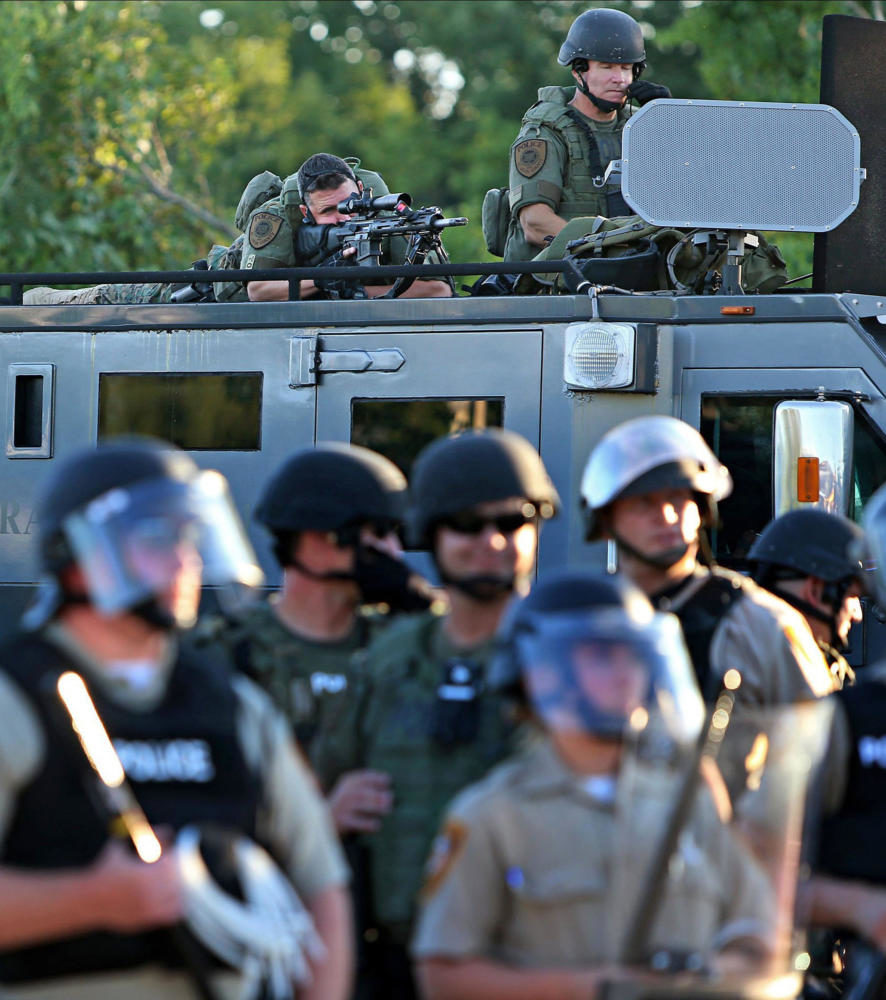Justice Department redacts vast majority of documents related to Ferguson
A police sharpshooter keeps an eye on protesters along W. Florissant Avenue on Tuesday, Aug. 12, 2014, in Ferguson, Mo. (David Carson/St. Louis Post-Dispatch/TNS)
October 3, 2017
The U.S. Department of Justice identified 400 pages of documents related to its Community Oriented Policing Services office’s actions in the wake of the 2014 shooting death of Michael Brown by then-Ferguson police officer Darren Wilson, but a vast majority were either totally or partially redacted before being released under the Freedom of Information Act.
Responding to an almost three-year-old FOIA request from the Post-Dispatch, DOJ FOIA Officer Chaun Eason determined that only 55 pages — mostly mundane COPS office communications about travel to St. Louis, talking-points memos, press releases, and other non-revelatory material — were totally releasable to the newspaper.
Almost two-thirds of the documents were totally redacted without any other reference to the person or persons who created them, the person or persons to whom they were intended, or the topic of the material withheld.
Advertisement
The Justice Department cited “third-party privacy” as the reason for the redactions in many of the documents. The DOJ’s response to the FOIA request, which was filed on Nov. 17, 2014 — also said that some material was being withheld as under “deliberative process protections” as defined under federal law.
The COPS office was a point agency in the DOJ’s response to Fergusoon under then-Attorney General Eric Holder. In late 2015, the COPS office released a 182-page report on St. Louis County police. Since then, St. Louis County Chief of Police Jon Belmar has expressed disappointment with a voluntary collaborative reform process his police force entered into with the COPS office. Belmar called it a “missed opportunity” earlier this year. And the Trump administration has shifted its focus away from such initiatives to stress law-and-order backing of police forces around the country.
A significant portion of the 65 pages of COPS document released with partial redactions related to planning of a youth forum the COPS office held in Ferguson 11 days after the shooting.
The COPS office was heavily involved in post-Ferguson crowd control, setting up community meetings, and other activities. Shortly after the Ferguson shooting, then-Attorney General Eric Holder said the COPS office would lead an initiative to bridge “mistrust between local law enforcement and their communities” which “has been topic of national discussion since protests were sparked in Ferguson. Mo.” from the Brown shooting death.
Ronald Davis, then COPS director, made several trips to St. Louis. Many of the documents released were about his or his subordinates’ travel to St. Louis, or the “technical assistance options” from the DOJ that he planned to talk with local officials about. Several pages released under the FOIA request were copies of news stories about Ferguson.
Typical of the partially redacted documents released was one dated Sept. 5, 2014 — less than a month after Brown’s death — in which the name of a redacted sender updates redacted recipients about the choice of hotels in St. Louis for an upcoming visit.
“Unfortunately, neither are Marriott properties,” the partially redacted message says.
Advertisement*
Several other un-redacted sections dealt with meetings COPS officials were setting up with staff members of the Missouri congressional delegation.
Typical of the partially redacted documents on potential policy-related issues was one dated Nov. 5, 2014 from COPS official Melanca Clark to other COPS officials Sandra Webb and Robert Chapman.
The subject line was “couple of updates.”
The entire remainder of the document was blacked out before release. So were the names of two recipients. The FOIA officer cited “clearly unwarranted invasion of the personal privacy of third parties” as a reason for not naming those two recipients.
By the numbers:
400 — Total number of pages identified as responsive to a Freedom of Information request on the Department of Justice’s Community Oriented Policing Services (COPS) offices work in Ferguson.
280 — Number of those pages totally redacted by DOJ.
They said it:
“None of the information being withheld is appropriate for discretionary disclosure.” — The Department of Justice’s Freedom of Information office explaining why 86 percent of COPS office documents related to its involvement in Ferguson should be fully or partially withheld from the public.
___
(c)2017 the St. Louis Post-Dispatch
Visit the St. Louis Post-Dispatch at www.stltoday.com
Distributed by Tribune Content Agency, LLC.
Advertisement








